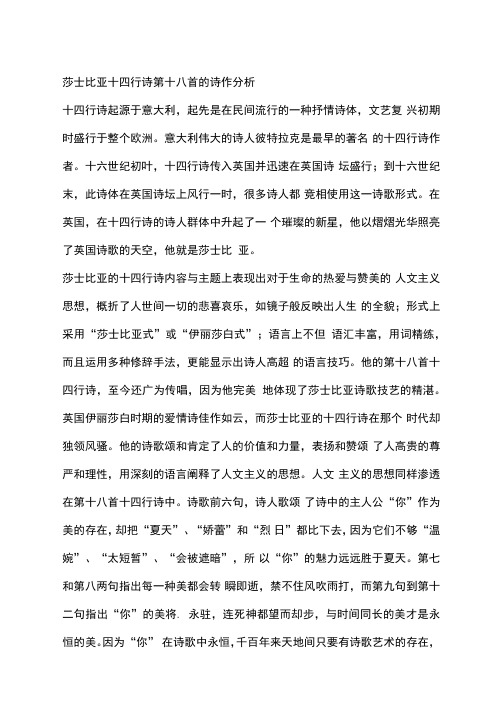莎士比亚十四行诗第十八首分析精品PPT课件
莎士比亚十四行诗第十八首的诗作分析

莎士比亚十四行诗第十八首的诗作分析十四行诗起源于意大利,起先是在民间流行的一种抒情诗体,文艺复兴初期时盛行于整个欧洲。
意大利伟大的诗人彼特拉克是最早的著名的十四行诗作者。
十六世纪初叶,十四行诗传入英国并迅速在英国诗坛盛行;到十六世纪末,此诗体在英国诗坛上风行一时,很多诗人都竞相使用这一诗歌形式。
在英国,在十四行诗的诗人群体中升起了一个璀璨的新星,他以熠熠光华照亮了英国诗歌的天空,他就是莎士比亚。
莎士比亚的十四行诗内容与主题上表现出对于生命的热爱与赞美的人文主义思想,概折了人世间一切的悲喜哀乐,如镜子般反映出人生的全貌;形式上采用“莎士比亚式”或“伊丽莎白式”;语言上不但语汇丰富,用词精练,而且运用多种修辞手法,更能显示出诗人高超的语言技巧。
他的第十八首十四行诗,至今还广为传唱,因为他完美地体现了莎士比亚诗歌技艺的精湛。
英国伊丽莎白时期的爱情诗佳作如云,而莎士比亚的十四行诗在那个时代却独领风骚。
他的诗歌颂和肯定了人的价值和力量,表扬和赞颂了人高贵的尊严和理性,用深刻的语言阐释了人文主义的思想。
人文主义的思想同样渗透在第十八首十四行诗中。
诗歌前六句,诗人歌颂了诗中的主人公“你”作为美的存在,却把“夏天”、“娇蕾”和“烈日”都比下去,因为它们不够“温婉”、“太短暂”、“会被遮暗”,所以“你”的魅力远远胜于夏天。
第七和第八两句指出每一种美都会转瞬即逝,禁不住风吹雨打,而第九句到第十二句指出“你”的美将. 永驻,连死神都望而却步,与时间同长的美才是永恒的美。
因为“你” 在诗歌中永恒,千百年来天地间只要有诗歌艺术的存在,诗歌和“你” 就能够永生。
所以“你”的美永不枯凋,这是一种生命的美,艺术的美,永驻人间。
诗人不但歌颂了美,还赞扬了爱。
诗人对“你”的歌颂与赞美不仅停留在对外在美的迷恋,而且歌颂了“你”的美德,因为这种美才能艳压群芳,连死神在他而前也不敢夸口。
这就是智慧的美,最有力量的美,因为它是与爱紧紧相连的。
十四行诗第十八首ppt课件

.
01 十 四 行 诗 介 绍 02 诗 歌 欣 赏 03 诗 歌 赏 析
.
Part 1
十四行诗介绍
.
十四
行诗
十四行诗是源于意大利民
间的一种抒情短诗,文艺复兴 初期时盛行于整个欧洲,其结 构十分严谨,分为上下两部分, 上段为八行,下段为六行,每 行十一个音节,韵脚排列:abba abba,cdc ded。
第六和第七行都以 And 起头,形成头韵, 但这两个并列的简单 陈述句从意义上看,造 成了语意在同一水平 上徘徊而不是递进,而 且用相同的And起头使 两句不仅在语意也在 形式上显得拖沓而无 变化,破坏了诗歌的音 韵美和形式美.
.
thanks for watching
.
.
莎士比亚的十四行诗的结构
却更严谨,他将十四个诗行分为 两部分,第一部分为三个四行, 第二部分为两行,每行十个音节 韵脚为:abab,cdcd,efef,gg。这样的格 式后来被称为"莎士比亚式"或"伊 丽莎白式"。
对诗人而言,诗的
结构越严谨就越难抒情, 而莎士比亚的十四行诗 却毫不拘谨,自由奔放, 正如他的剧作天马行空, 其诗歌的语言也富于想 象,感情充沛。
.
起承转合
头四行是“起”, 表明他所歌颂的 年轻友人的不同 凡响的美丽;
承
后四行是“转”,宣 告虽然别人的美貌 难以存留,可他所 爱的人却可以通过 他的不朽的诗篇来
得以永存
合
起
中间四行是 “承”,讲岁月 无常,青春难 驻
最后两行是“合”,是对一 首诗所作的小结。以富有 转思诗辨歌的艺语术言 以总 及结 所了 歌人 颂类 对、 象 之间的关联:只要人类尚
英国文学8.2 讲解Sonnet 18(课堂PPT)

只要人类呼吸,目放光芒, 诗行也会同长,使你命芳。
Speakers’ Corner
17
Sonnet 18 of Shakespeare
Structure
proposal (1-2) argument (3-12) conclusion(13-14)
18
Sonnet 18
Shall I compare thee to a summer’s day? ∨— ∨— ∨— ∨— ∨— a Thou art more lovely and more temperate: ∨— ∨— ∨— ∨— ∨— b Rough winds do shake the darling buds of May, — —∨— ∨— ∨— ∨— a And Summer’s lease hath all too short a date; ∨— ∨— ∨— ∨— ∨— b
7
音步:
我们知道凡是有两个以上音节的英文单词,都有重 读音节与轻读音节之分,在一句话中,根据语法、 语调、语意的要求,有些词也要重读,有些要轻读。 如He went to town to buy a book. I’m glad to hear the news. 英文中有重读和轻读之分,重读的音节和 轻读的音节,按一定模式配合起来,反复再现,组 成诗句,听起来起伏跌宕,抑扬顿挫,就形成了诗 歌的节奏。多音节单词有重音和次重音,次重音根 据节奏既可视为重读,也可视为轻读。读下面这两 句诗:
You are more lovely and more constant: Rough winds shake the beloved buds of May
And summer is far too short:
莎士比亚十四行诗18分析

莎士比亚所处的英国伊莉莎白时代是爱情诗的盛世,写十四行诗更是一种时髦。
莎士比亚的十四行诗无疑是那个时代的佼佼者,其十四行诗集更是流传至今,魅力不减。
他的十四行诗一扫当时诗坛的矫柔造作、绮艳轻糜、空虚无力的风气。
据说,莎士比亚的十四行诗是献给两个人的:前126首献给一个贵族青年,后面的献给一个黑肤女郎。
这首诗是十四行诗集中的第18首,属前者。
也有人说,他的十四行诗是专业的文学创作。
当然,这些无关宏旨,诗歌本身是伟大的。
莎士比亚的十四行诗总体上表现了一个思想:爱征服一切。
他的诗充分肯定了人的价值、赞颂了人的尊严、个人的理性作用。
诗人将抽象的概念转化成具体的形象,用可感可见的物质世界,形象生动地阐释了人文主义的命题。
诗的开头将“你”和夏天相比较。
自然界的夏天正处在绿的世界中,万物繁茂地生长着,繁阴遮地,是自然界的生命最昌盛的时刻。
那醉人的绿与鲜艳的花一道,将夏天打扮得五彩缤纷、艳丽动人。
但是,“你”却比夏天可爱多了,比夏天还要温婉。
五月的狂风会作践那可爱的景色,夏天的期限太短,阳光酷热地照射在繁阴班驳的大地上,那熠熠生辉的美丽不免要在时间的流动中凋残。
这自然界最美的季节和“你”相比也要逊色不少。
而“你”能克服这些自然界的不足。
“你”在最灿烂的季节不会凋谢,甚至“你”美的任何东西都不会有所损失。
“你”是人世的永恒,“你”会让死神的黑影在遥远的地方停留,任由死神的夸口也不会死去。
“你”是什么?“你”与人类同在,你在时间的长河里不朽。
那人类精神的精华——诗,是你的形体吗?或者,你就是诗的精神,就是人类的灵魂。
诗歌在形式上一改传统的意大利十四行诗四四三三体,而是采用了四四四二体:在前面充分地发挥表达的层次,在充分的铺垫之后,用两句诗结束全诗,点明主题。
全诗用新颖巧妙的比喻,华美而恰当的修饰使人物形象鲜明、生气鲜活。
诗人用形象的表达使严谨的逻辑推理变得生动有趣、曲折跌宕,最终巧妙地得出了人文主义的结论。
The Author:William Shakespeare (/ˈʃeɪkspɪər/;26 April 1564 (baptised) –23 April 1616) was an English poet, playwright and actor, widely regarded as the greatest writer in the English language and the world'spre-eminent dramatist.He is often called England's national poet and the "Bard of Avon".His extant works, including some collaborations, consist of about 38 plays,154 sonnets, two long narrative poems, and a few other verses, the authorship of some of which is uncertain. His plays have been translated into every major living language and are performed more often than those of any other playwright.Shakespeare was born and brought up inStratford-upon-Avon. At the age of 18, he married Anne Hathaway, with whom he had three children: Susanna, and twins Hamnet and Judith. Between 1585 and 1592, he began a successful career in London as an actor, writer, and part-owner of a playing company called the Lord Chamberlain's Men, later known as the King's Men. He appears to have retired to Stratford around 1613 at age 49, where he died three years later. Few records of Shakespeare's private life survive, and there has been considerable speculation about such matters as his physical appearance, sexuality, religious beliefs, and whether the works attributed to him werewritten by others.Shakespeare produced most of his known work between 1589 and 1613.His early plays were mainly comedies and histories and these works remain regarded as some the best work produced in these genres even today. He then wrote mainly tragedies until about 1608, including Hamlet, King Lear, Othello, and Macbeth, considered some of the finest works in the English language. In his last phase, he wrote tragicomedies, also known as romances, and collaborated with other playwrights. Many of his plays were published in editions of varying quality and accuracy during his lifetime. In 1623, John Heminges and Henry Condell, two friends and fellow actors of Shakespeare, published the First Folio, a collected edition of his dramatic works that included all but two of the plays now recognised as Shakespeare's. It was prefaced with a poem by Ben Jonson, in which Shakespeare is hailed, presciently, as "not of an age, but for all time".Shakespeare was a respected poet and playwright in his own day, but his reputation did not rise to its present heights until the 19th century. The Romantics, in particular, acclaimed Shakespeare's genius, and the Victorians worshipped Shakespeare with a reverence that George Bernard Shaw called "bardolatry".[8] In the 20th century, his work was repeatedly adopted and rediscovered by new movements in scholarship and performance. His plays remain highly popular today and are constantly studied, performed, and reinterpreted in diverse cultural and political contexts throughout the world.It is not known exactly when Shakespeare began writing, but contemporary allusions and records of performances show that several of his plays were on the London stage by 1592.[30] By then, he was sufficiently well known in London to be attacked in print by the playwright Robert Greene in his Groats-Worth of Wit:...there is an upstart Crow, beautified with our feathers, that with his Tiger's heart wrapped in a Player's hide, supposes he is as well able to bombast out a blank verse as the best of you: and being an absolute Johannes factotum, is in his own conceit the only Shake-scene in a country.Scholars differ on the exact meaning of these words,but most agree that Greene is accusing Shakespeare of reaching above his rank in trying to matchuniversity-educated writers such as Christopher Marlowe, Thomas Nashe and Greene himself (the "university wits").The italicised phrase parodying the line "Oh, tiger's heart wrapped in a woman's hide" from Shakespeare's Henry VI, Part 3, along with the pun "Shake-scene", identifies Shakespeare as Greene's target. Here Johannes Factotum—"Jack of all trades"—means a second-rate tinkerer with the work of others, rather than the more common "universal genius". Greene's attack is the earliest surviving mention of Shakespeare's career in the theatre. Biographers suggest that his career may have begun any time from the mid-1580s to just before Greene's remarks.[35] From 1594, Shakespeare's plays were performed by only the Lord Chamberlain's Men, a company owned by a group of players, including Shakespeare, that soon became the leading playing company in London.[36] After the death of Queen Elizabeth in 1603, the company was awarded a royal patent by the new king, James I, and changed its name to the King's Men.[37]In 1599, a partnership of company members built their own theatre on the south bank of the River Thames, which they called the Globe. In 1608, the partnership also took over the Blackfriars indoor theatre. Records of Shakespeare's property purchases and investments indicate that the company made him a wealthy man.[38] In 1597, he bought the second-largest house in Stratford, New Place, and in 1605, he invested in a share of the parish tithes in Stratford.[39]Some of Shakespeare's plays were published in quarto editions from 1594. By 1598, his name had become a selling point and began to appear on thetitle pages.[40] Shakespeare continued to act in his own and other plays after his success as a playwright. The 1616 edition of Ben Jonson's Works names him on the cast lists for Every Man in His Humour (1598) and Sejanus His Fall (1603).[41] The absence of his name from the 1605 cast list for Jonson's Volpone is taken by some scholars as a sign that his acting career was nearing its end.[42] The First Folio of 1623, however, lists Shakespeare as one of "the Principal Actors in all these Plays", some of which were first staged after Volpone, although we cannot know for certain which roles he played.[43] In 1610, John Davies of Hereford wrote that "good Will" played "kingly" roles.[44] In 1709, Rowe passed down a tradition that Shakespeare played the ghost of Hamlet's father.[45] Later traditions maintain that he also played Adam in As You Like It and the Chorus in Henry V,[46] though scholars doubt the sources of the information.[47] Shakespeare divided his time between London and Stratford during his career. In 1596, the year before he bought New Place as his family home in Stratford, Shakespeare was living in the parish of St. Helen's,Bishopsgate, north of the River Thames.[48][49] He moved across the river to Southwark by 1599, the year his company constructed the Globe Theatrethere.[48][50] By 1604, he had moved north of the river again, to an area north of St Paul's Cathedral with many fine houses. There he rented rooms from a French Huguenot named Christopher Mountjoy, a maker of ladies' wigs and other headgear.[51]Later years and deathRowe was the first biographer to record the tradition, repeated by Johnson, that Shakespeare retired to Stratford 'some years before his death'.[52][53] He was still working as an actor in London in 1608; in an answer to the sharers' petition in 1635 Cuthbert Burbage stated that after purchasing the lease of the Blackfriars Theatre in 1608 from Henry Evans, the King's Men 'placed men players' there, 'which were Heminges, Condell, Shakespeare, etc.'.[54] However it is perhaps relevant that the bubonic plague raged in London throughout 1609.[55][56] The London public playhouses were repeatedly closed during extended outbreaks of the plague (a total of over 60 months closure between May 1603 and February 1610),[57] which meant there was often no acting work. Retirement from all work was uncommon at that time.[58] Shakespeare continued to visit London during the years 1611–1614.[52] In 1612, he was called as a witness in Bellott v. Mountjoy, a court case concerning the marriage settlement of Mountjoy's daughter, Mary.[59] In March 1613 he bought a gatehouse in the former Blackfriars priory;[60] and from November 1614 he was in London for several weeks with his son-in-law, John Hall.[61] After 1610, Shakespeare wrote fewer plays, and none are attributed to him after 1613.[62] His last three plays were collaborations, probably with John Fletcher,[63] who succeeded him as the house playwright for the King's Men.[64]Shakespeare died on 23 April 1616, at the age of 52.[65] He died within a month of signing his will, a document which he begins by describing himself as being in “perfect health”. There is no extant contemporary source that explains how or why he died. After half a century had passed, John Ward, the vicar of Stratford, wrote in his notebook: “Shakespeare, Drayton and Ben Jonson had a merry meeting and, it seems, drank too hard, for Shakespeare died of a fever therecontracted.”[66][67] This is not impossible, for Shakespeare knew Jonson and Drayton. Of the tributes that started to come from fellow authors, one refers to his relatively early death: “We wondered, Shakespeare, that thou went’st so soon/From the world’s stage to the grave’s tiring room.”[68]He was survived by his wife and two daughters. Susanna had married a physician, John Hall, in 1607,[69] and Judith had married Thomas Quiney, a vintner, two months before Shakespeare's death.[70] Shakespeare signed his last will and testament on 25 March 1616; the following day his new son-in-law, Thomas Quiney was found guilty of fathering an illegitimate son by Margaret Wheeler,who had died during childbirth. Thomas was ordered by the church court to do public penance which would have caused much shame and embarrassment for the Shakespeare family.In his will, Shakespeare left the bulk of his large estate to his elder daughter Susanna.[72] The terms instructed that she pass it down intact to "the first son of her body".[73] The Quineys had three children, all of whom died without marrying.[74] The Halls had one child, Elizabeth, who married twice but died without children in 1670, ending Shakespeare's direct line.[75] Shakespeare's will scarcely mentions his wife, Anne, who was probably entitled to one third of his estate automatically.[76] He did make a point, however, of leaving her "my second best bed", a bequest that has led to much speculation.[77] Some scholars see the bequest as an insult to Anne, whereas others believe that the second-best bed would have been the matrimonial bed and therefore rich in significance.Shakespeare was buried in the chancel of the Holy Trinity Church two days after his death.[79] The epitaph carved into the stone slab covering his grave includes a curse against moving his bones, which was carefully avoided during restoration of the church in 2008:[80]Shakespeare has been commemorated in many statues and memorials around the world, including funeral monuments in Southwark Cathedral and Poets' Corner in Westminster Abbey..。
Sonnet 18ppt

3、双关 (pun) 和夸张 (hyperbole) 的使用。双关是一种文字游戏, 指利用读音或词根相似的词的不同含义或语法功能。在第七行“And every fair from fair sometime declines )”,这里的两个“fair”含义就不同, 第一个意为“美的人或物”,而第二个的意思则是指“美本身”,所以 这是运用了双关。夸张就是言过其实的陈述,一般是为了强调。夸张的 手法在该诗中也多次使用,如第九行“thy eternal summer”中的“eternal” 这个词上。根据自然规律,每一种美的事物都将逐渐丧失其美丽,那么 诗中人的美又怎能永恒呢?“Nor shall death brag thou wander’ st in his shade ”,每个人早晚总免不了一死,我们都不可能不朽,那么诗中人又 怎能不受这种自然规律的约束呢? 诗中除了使用到以上修辞手法外,还使用了矛盾 法 (paradox)、 头 韵 法 (alliteration)、 提 喻(synecdoche) 和倒装 (inversion) 等多种手 法。从以上的分析可以看出这首十四行诗中用到的修辞格不仅多,而且 全面,既有语音手段的修辞格 (头韵),也有词汇手段的修辞格 (明喻、 暗喻、拟人、夸张、矛盾法、双关、借代),还有句法手段的修辞格 (设问句和倒装),我们不得不为莎士比亚语言艺术的风采所折服、感 叹。
Shall I compare thee to a summer's day? Thou art more lovely and more temperate: Rough winds do shake the darling buds of May, And summer's lease hath all too short a date.
William-Shakespeare-sonnet-18PPT课件

25
1) introduction to Shakespeare's Sonnets
• 154 sonnets:
• 1-126 addressed to a young man, beloved of the poet, of superior beauty and rank but of somewhat questionable morals and constancy
37 plays; divided into comedies, histories, and tragedies
12
The First Period(1590-1600):
The first period of Shakespeare’s dramatic composition was his apprenticeship in play writing.
20
• Which can be translated to;
• Good friend for Jesus sake forbear • To dig the dust enclosed here! • Blest be the man that spares these stones, • And curst be he that moves my bones.
William-Shakespeare-sonnet-18PPT课件

11
3. Career
• 37plays; 2 narrative peoms and 154 sonnet#43;comedy Second Period 1601-1608 :tragdy Third Period 1609-1612:tragi-comdy
Stratford-Upon-Avon, where Shakespeare was born and grew up
6
7
2. family
• Middle-Class parents • Shakespeare was 3rd of 8 children • at 14, family in debt • at 18 married Anne Hathaway, 8 years older
and four comedies: The Comedy of Errors(错误的喜剧)
The Two Gentlemen of Verona (维洛那二绅士) The Taming of the Shrew(驯悍记), and Love’s Labour’s Lost(爱的徒劳).
Love’s Labour’s
4
1.life
– Some documents that we have are baptismal registration, marriage license, and records of real estate transactions.
5
London, where Shakespeare’s reputation was born (and where the Globe was located)
• 1586 left for London; theater: • support the growing family
莎士比亚十四行诗Sonnet18ppt

通过对爱情、生命和时间的思考,莎士比亚也引发了读者对社会价值观的反思,即人们应该如何看待和评价爱情、 生命和时间等基本问题。
05
Sonnet 18的表演和演绎
舞台表演
莎士比亚的Sonnet 18在舞台上通常由一位演员以诗歌朗诵的形式呈现, 通过声音的抑扬顿挫、节奏和情感表达来传达诗中的意境和情感。
03
Sonnet 18在世界文学史上占据着举足轻重的地位,为世界文 学的发展和繁荣做出了重要的贡献。
04
Sonnet 18的解读和启示
对爱情的思考
爱情是永恒的
Sonnet 18中,莎士比亚赞美了爱情超越时间、死亡和季节的力量,表达了爱情 永恒不变的主题。
爱情的复杂性和矛盾性
诗中通过对比春天和黑夜、白昼和死亡等对立的概念,展现了爱情的复杂性和矛 盾性,即爱情既美好又痛苦,既充满希望又充满失望。
情感和主题表达
情感
这首诗表达了诗人对美丽事物的深深眷恋,以及对时间无情流逝的无奈和哀怨。
主题表达
通过细腻的情感表达和深入的主题探讨,这首诗展现了莎士比亚对人性、生命 和美的深刻思考。
03
Sonnet 18的文学价值
在莎士比亚作品中的地位
莎士比亚十四行诗是英国文学史上的重要遗产, 而Sonnet 18是其中的杰作之一。
主题、结构和语言。
03
该诗对浪漫主义、现代主义和后现代主义等文学流派
都有一定的影响,为世界文学的发展做出了贡献。
在世界文学史上的地位
01
Sonnet 18在世界文学史上具有重要地位,被广泛认为是英语 文学中的经典之作。
02
该诗以其卓越的艺术价值和深邃的思想内涵,成为了世界各 地学者和读者研究和欣赏的对象。
- 1、下载文档前请自行甄别文档内容的完整性,平台不提供额外的编辑、内容补充、找答案等附加服务。
- 2、"仅部分预览"的文档,不可在线预览部分如存在完整性等问题,可反馈申请退款(可完整预览的文档不适用该条件!)。
- 3、如文档侵犯您的权益,请联系客服反馈,我们会尽快为您处理(人工客服工作时间:9:00-18:30)。
感谢聆听
不足之处请大家批评指导
Please Criticize And Guide The Shortcomings
演讲人:XXXXXX 时 间:XX年XX月XX日
Phonological level
• Omission • 头韵(alliteration)是古英语诗歌作品的显
著特征, 如第六行和第七行都是以And开 头,fair from fair等。 • 尾韵(end rhyme),第Байду номын сангаас行的temperate与 第四行的date押韵。
Phonological level
And often is his gold complexion dimmed Rough winds do shake the darling buds of May 双关(pun) And every fair from fair sometime declines
• 夸张(hyperbole) thy eternal summer
• 每行五个音步,抑扬格。 • 韵脚安排是abab,cdcd,efef,gg 亦即这十
四行可分四组,即前四行,中四行,后四 行和最后两行。十四行诗的一个特点是它 有“起” “承” “转” “合”四部分。
Lexical level
• Archaism古体词 thou=you thee=you(宾格) thy=your has=hath
SONNET 18
Shall I /compare /thee/ to a sum/mer's day? Thou art/ more love/ly and /more tem/perate: Rough winds/ do shake/ the dar/ling buds/ of May, And sum/mer's lease /hath all/ too short/ a date: Sometime/ too hot /the eye/ of hea/ven shines, And often/ is his/ gold com/plexion dimmed: And eve/ry fair/ from fair /sometime /declines, By chance/ or na/ture's chan/ging course/,untrimmed: But thy /etern/al sum/mer shall /not fade Nor lose /possess/ion of /that fair t/hou ow’st;
Nor shall /Death brag/ thou wan/der'st in/ his shade, When in/ eter/nal lines t/o time /thou grow’st:
So long /as men /can breathe /or eyes /can see, So long /lives this/, and this /gives life /to thee.
Semantic Diavation
明喻(simile)和设问(rhetoric question) shall I compare thee to a summer’s day? 暗喻(metaor) And summer’s lease hath all too short a date 拟人(personification) Sometime too hot the eye of heaven shines
Nor shall death brag thou wander’ st in his shade
• 总的来说,莎士比亚的这首诗为我们描绘 了夏日的璀璨,无论从形式还是内容,从 主题方面还是语言方面,都能堪称是诗歌 中的精品。
结束语
当你尽了自己的最大努力时,失败也是伟大的 ,所以不要放弃,坚持就是正确的。
莎士比亚十四行诗第十八首
• 十四行诗介绍 • 莎士比亚十四行诗第十八首 • 文体分析
十四行诗介绍
• 十四行诗(sonnet):过去也曾音译为《商籁诗》。 十四行,抑扬格,五音步用作全诗的形式。首先 出现于意大利,16世纪中传入英国,为伊丽莎白 时代(伊丽莎白一世在位时期为1558一1603)文 人所宠爱,莎士比亚、斯宾塞及西德尼(sidney) 全都写下过著名的十四行诗。18世纪十四行诗曾 受到冷落。但后又被浪漫派诗人济慈、华兹华斯 等人所复兴,以后许多诗人也多所采用。英国十 四行诗有两种类型:意大利式(Petrarvhan)及莎 士比业式(Shakesperoan)(英国式)。
